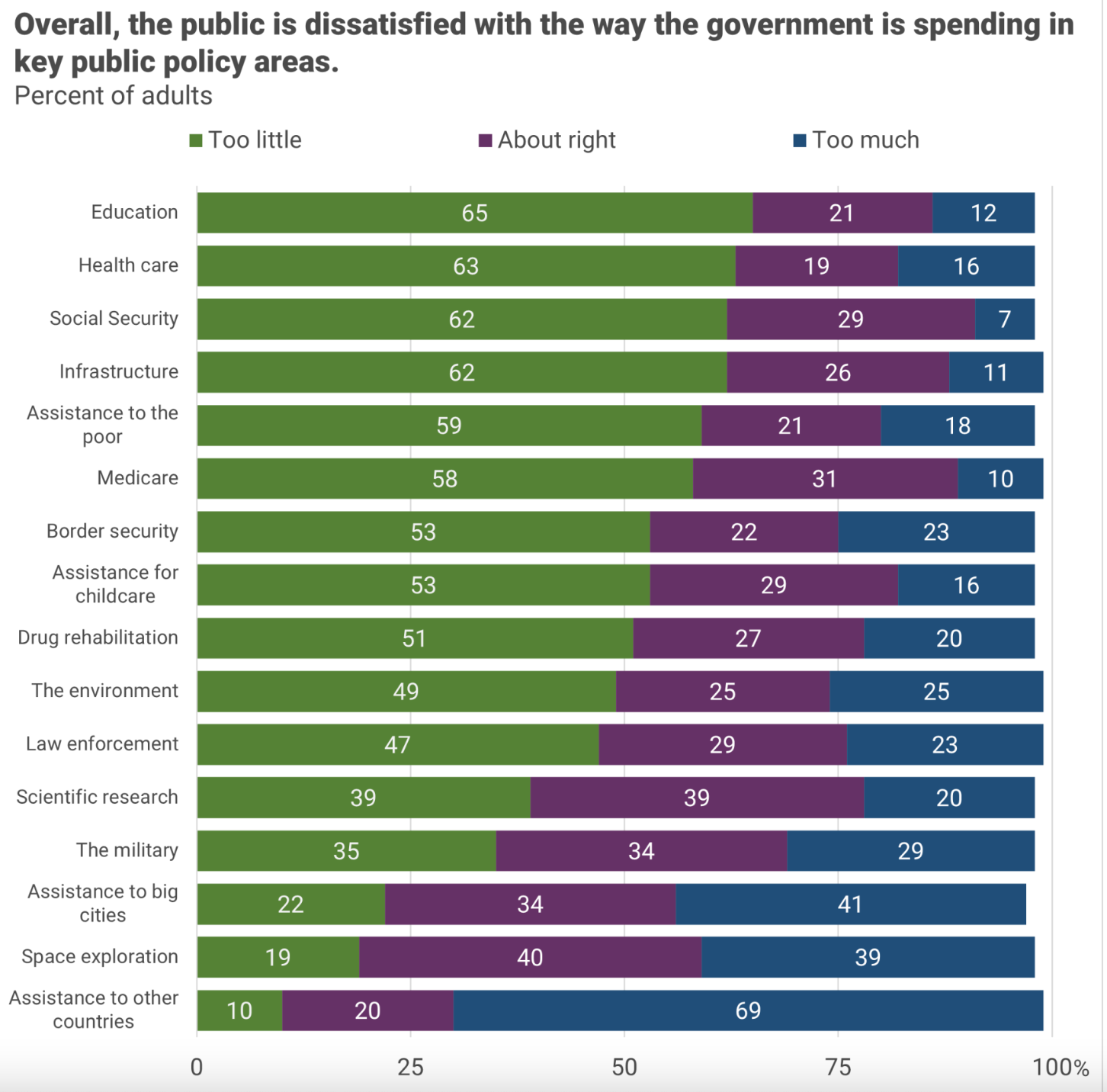Education is a Winning Issue for Democrats
Dems' popular policies are winners up and down the ticket
The economy, foreign policy, reproductive rights, climate, and—critically—democracy are just some of the issue areas that will help decide the 2024 election. As a teacher and teacher advocate, I’ve been thinking about how K-12 education, which typically gets scant attention in presidential election years, can and should be a winning issue for Democrats up and down the ballot.
Education is being used to create division
Two-thirds of Americans say they’re exhausted by politics; 55% are angered by it. Americans are tired of inaction and division, and education has been a key way the Republican Party has sought to divide us from our fellow citizens, whether they are across the country or across the street.
Though denigrating the public schools has been a long-term national GOP project, in the Trump era, the party has stoked fierce division through culture wars fought in the schools and through politicizing local school board elections. After the tumultuous events in one Texas district, writes Mike Hixenbaugh, author of They Came for the Schools, “Republicans believed they could motivate voters by recasting nonpartisan school board elections as fights for the soul of America.”
Americans aren’t embracing these divisive efforts
While these culture wars have disrupted and distracted, they have failed to shake broad support for public education. A recent USC poll showed "Americans across the political spectrum overwhelmingly agree on the importance of a free, public education for every child” and “its core functions of teaching basic literacy, numeracy and civics." Historically, explains Adam Laats, Professor of Education and History at Binghamton University, attacks on public schools have hurt conservative politicians. That hasn’t, however, stopped them from pursuing this fresh round.
The extremity of the current wave of attacks has reminded many voters of the value of school boards focused on solving local problems through democratic processes instead of sowing division and distrust based on rancorous national debates. In the 2023 election, liberal and moderate school board candidates started turning the tide, winning the majority of races targeted by right-wing dark money groups.
Book banning has been a particularly losing issue for the GOP, with two-thirds of voters opposed to removing books from school libraries.
Despite a bipartisan backlash against book bans and upswell of support for libraries, the education discussion in The Heritage Foundation’s Project 2025 leads off with horrific smears of librarians and teachers as pornographers and fascistic calls to imprison them.
Recognizing that its wild ideas are hugely unpopular, Trump pretends ignorance of Project 2025, a nearly 1,000-page plan for the next GOP presidency, despite 8 of 10 of the people producing it having had formal roles in his administration. There is also much overlap between Project 2025 and the official GOP platform, which as Axios put it, "pledged to implement universal school choice, boost parental rights and promote 'patriotic' standards for civics education. In other words, under former President Donald Trump, education across the country would look a lot like it does in Florida."
In other other words, the party plans to double down on division, culture wars, censorship, and miseducation. Many voters are more familiar today, however, with what "parental rights" is code for: the rights of a minority to make decisions for all parents and for all children, not just their own. Most disagree with a repressive and regressive curriculum around history and race, a focus of GOP education censorship efforts.
Voters want well-funded public schools and balanced budgets
The GOP is all in on school vouchers, which provide public dollars for private schooling, but as more is learned about how they work, the public is increasingly out. State by state, Republicans are aggressively pushing vouchers, Education Savings Accounts, and other programs that divert education dollars to private institutions. Still, in Texas, voucher bills have repeatedly been voted down, and a universal voucher bill in red Tennessee recently failed as rural conservatives understand that vouchers threaten the viability of their schools and entire communities.
Voters in states where these bills have passed are waking up to decimated state budgets and facing cuts in education and other essential services. In Arizona, where proponents misled the public about costs, vouchers have ripped a $1.4 billion hole in the state budget that will defund water infrastructure work, for example. This outcome shouldn’t be surprising, as vouchers go mostly to families with children already enrolled in private schools, private schools are raising tuitions in response to vouchers, and many programs have little transparency or accountability. There is nothing fiscally responsible about this GOP push.
Republican education policy also violates Americans' overwhelming belief in the separation of church and state. Vouchers funnel tax dollars toward religious institutions; in fact, the majority are used at religious schools. At the same time, the GOP is imposing its particular religious vision directly on public schools, allowing the hiring of school chaplains and requiring teachers post the Ten Commandments and teach with the Bible.
Alarmingly, both the GOP platform and Project 2025 call for the elimination of the US Department of Education and for dramatic cuts in education spending. Meanwhile, a whopping two-thirds of Americans think we already spend too little on education.
There is much to fear in GOP plans, which ignore the concerns of the majority, who want well-funded public schools. As Jessica Alcantara and Laura Petty put it in TIME, "Make no mistake: The goal is to end public education. But dismantling our public schools isn’t just the plan if Trump is reelected—it is already happening."
Democrats, though, at the federal, state, and local level are committed to fighting for schools that are adequately and equitably funded and for classrooms that are well-staffed with professional, certified teachers.
Democrats are focused on the priorities of the majority of parents
While Republicans rail against social-emotional learning (proven to help students regulate emotions and build healthy social relationships) and substitute untrained chaplains for professional counselors, parents are deeply worried about their children’s mental health.
Seventy-six percent are worried about depression and anxiety and 74% fear their students being bullied. Addressing these top concerns, the Biden/Harris Administration is bringing funding and resources to communities and schools to help with the mental health crisis.
Parents are also worried about school safety. Blaming school shootings on mental health but failing to fund mental health services, the GOP's answer as always is more guns: arming teachers. Democrats, meanwhile, continue to fight for the sensible gun laws the public overwhelmingly supports and achieved the first major, bipartisan national gun safety legislation in decades. The Biden/Harris team has also made desperately needed investments in healthy, modern school infrastructure.
Of course, parents care about academics, especially as schools and communities continue to recover from the deadly pandemic. The Biden/Harris 2024 Improving Student Achievement Agenda focuses on practical solutions to absenteeism and academic underachievement, including high-impact tutoring, a recovery strategy embraced by governors on both sides of the aisle.
In The Education Wars, Jennifer Berkshire and Jack Schneider explain how in the past Democrats have contributed to the myth that education alone can solve inequality and poverty. But today’s party understands families and children need more to thrive, evidenced by the success of The American Rescue Plan in halving child poverty. By contrast, Republicans at the state level and in the US Congress oppose even more modest popular measures like funding school lunches.

Yes—unironically—the children are our future (sorry that song is in your head now)
The Democrats have much more to run on than fear. Voters want hope, and where better to look for hope than in America’s children and in their academic, artistic, physical, social, and personal development? Hope is manifest in the polls that show most parents—based on direct personal experience—continue to see their local schools and teachers positively.
Vibrant public schools benefit everyone, regardless of whether or not they have, had, or will ever have children in them. In the words of Berkshire and Schneider:
We care tremendously about our schools…we recognize that the next generation of Americans will come out of the schools and take up places in political, social, and economic life. We look to the school to solve our society’s problems, hoping that tomorrow’s answers will come from today’s students.
The GOP rhetorically uses children to stoke fear (including fear of other people's children.) The Democrats have an opportunity to give voters hope through the future that children symbolize, a future that is small-d democratic, bright, and shaped in important part by the public nature of public schools.







